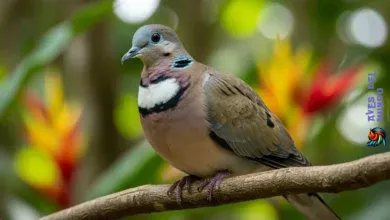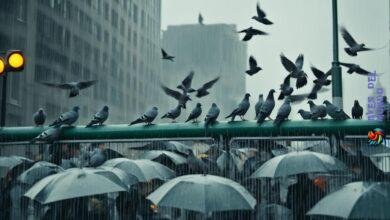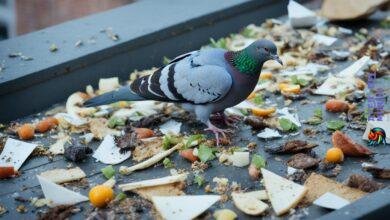Most American grocery stores have over 70 different types of bread. Yet, not a single one is good for pigeons. Even though we often see people feeding bread to pigeons, it’s not a healthy choice. Feeding bread to these birds can actually cause them to become malnourished. Bird lovers are trying hard to teach people about this. They want to help everyone understand what safe foods for pigeons are. This is to ensure the health and happiness of these city birds.
The Popular Belief About Pigeons and Bread
Picture this: people in parks throwing crumbs, pigeons hurrying to eat them. This has made feeding pigeons and bread a common sight. Many think giving bread to these birds is harmless and fun. However, this practice lacks nutritional value for bird feeding habits.
Avian experts highlight the truth about feeding bread to pigeons – it doesn’t suit their dietary needs. Pigeons might not seem sick from bread right away. But in the long run, it can harm their health in ways we can’t see. Below is a table comparing bread to healthier food options.
| Food Item | Nutritional Value | Impact On Pigeons |
|---|---|---|
| Bread (especially white) | Low in essential vitamins and minerals | May lea to malnutrition and overeating |
| Seeds and Grains | High in fiber and nutrients | Supports overall health and dietary needs |
| Peas and Corn | Rich in protein and carbohydrates | Provides energy and aids in muscle development |
| Fruits (in moderation) | Contains vitamins, minerals, and fiber | Enhances diet variety and nutritional intake |
It’s key to realize that pigeons and bread don’t mix as well as some think. Bread lacks the diverse nutrients found in a natural pigeon diet. So, changing your bird feeding habits to healthier choices is better for their health.
Before feeding pigeons from your lunch, think again. What’s easy for you might not be best for them. Choosing nutrient-rich foods helps pigeons thrive. It also shows you care about our feathered friends and their well-being.
Can Pigeons Eat Bread?
People ask, can pigeons eat bread? This question sparks a big debate among pigeon lovers. Bread is easy to feed pigeons, but we must look at their full dietary needs. This ensures their health and happiness.
The Debate Among Pigeon Feeders
In cold weather, some think bread is good for pigeons, giving them energy. Yet, others say pigeons need a diet with more seeds because it’s more nutritious than just bread. This difference in opinion comes from watching how city pigeons live and worrying about the effects of too much bread.
Health Impacts of Bread on Pigeons
Bird experts agree: feeding pigeons bread is bad. It lacks needed nutrients. Eating too much bread can cause health problems like Angel Wing syndrome. It happens in birds, especially those living near water.
Moldy bread is also dangerous. It can block their digestive system and attract pests. This highlights why it’s key to feed pigeons safe foods instead of just what’s convenient.
Looking at the pigeon diet closely shows how important seeds and grains are. They provide pigeons with all the nutrients they need. So, pigeon feeders should offer healthier food options. This helps pigeons stay healthy and live longer.
Understanding Pigeon Diet Essentials
When thinking about what do pigeons eat, knowing the right mix of proteins, fats, and carbs is key. Pigeons have high metabolism and small bellies. So, they need foods rich in nutrients, mainly grains and seeds. For anyone wanting to feed birds the right way, understanding the natural foods that help pigeons is important. This goes beyond the common wrong idea that bread is okay.
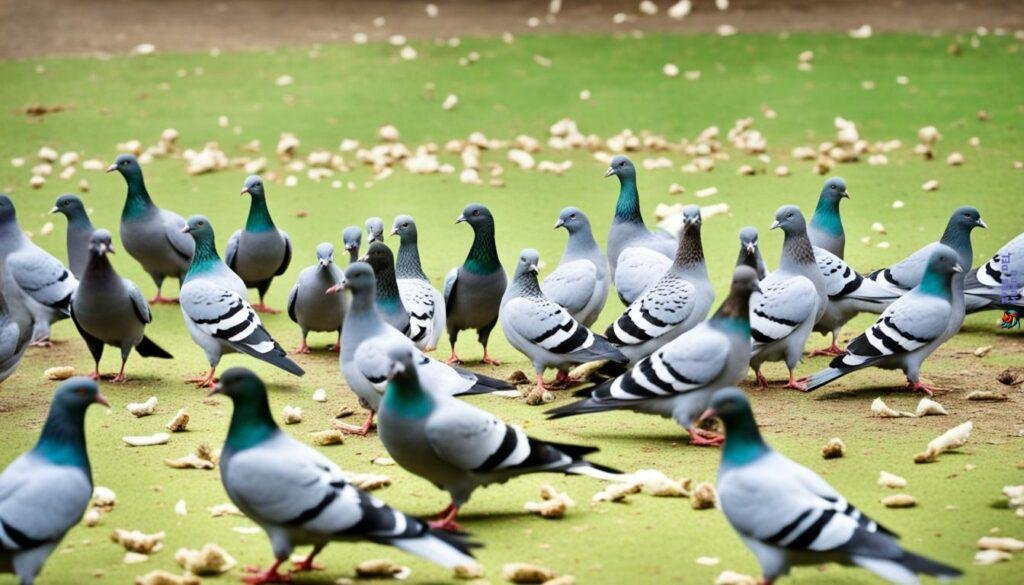
Pigeons have adjusted their diet to survive in many places. This skill is valuable. But feeding them the wrong food can harm their health. It’s important to meet their dietary needs. This helps not just the pigeons, but also the environment they live in.
| Natural Foods for Pigeons | Benefits |
|---|---|
| Grains (e.g., millet, barley) | Rich in carbohydrates and fiber, promoting digestive health |
| Seeds (e.g., safflower, sunflower) | High in fats and oils needed for energy and feather health |
| Fruits (e.g., berries, melons) | Provides natural sugars and vitamins for efficient metabolism |
| Legumes (e.g., lentils, peas) | Offers proteins aiding in muscle development and repair |
| Nuts (e.g., unsalted peanuts) | Contains essential fats that contribute to overall health |
It’s vital for those feeding pigeons to know that their diet is intricate. Moving from processed foods to a natural diet is crucial. Opting for peanuts and certain fruits is way better than human junk food for these birds.
The Risks of Feeding Pigeons Bread
Many people enjoy feeding pigeons bread, but it’s not good for their health. As you walk in parks, you’ll see pigeons hoping for food. The bread they get can cause serious health problems.
Malnutrition Concerns
Malnutrition in pigeons worries experts and animal lovers. Bread doesn’t give pigeons what they need to be healthy. It’s filled with calories that don’t have the nutrients pigeons need. Giving them bread can make them miss out on better food, leading to poor health.
Pigeons might not look sick at first from bad food. But over time, lack of good nutrition can show in their looks and actions.
How Bread Fills Without Nourishing
Feeding pigeons bread affects them negatively. They feel full from bread but don’t get the nutrients they need. They might not look for seeds and bugs that are better for them.
In winter, a diet of bread is even worse for pigeons. They need more food to stay warm. But bread makes them feel full too soon, leaving them cold.
| Feeding Pigeons Bread | Healthy Alternatives |
|---|---|
| High in empty calories | Rich in essential nutrients |
| Poorly balanced diet | Varied sources of seeds and legumes |
| Potential for overfeeding | Regulated intake to maintain health |
| Leads to malnutrition and disease | Supports robust immunity and growth |
Considering these points, think twice before feeding pigeons bread. Choose healthier options to keep them well. By feeding them right, we help make sure pigeons can live happily around us.
Common Misconceptions About Feeding Birds
Many of us think what’s good for us is also good for birds. This is not always true. This belief has made us feed our feathered friends food that isn’t right for them.
Human foods don’t have the varied nutrients birds need. Let’s look at some myths and their truths:
- Myth: Leftover human food is always good for birds.
- Truth: Birds require diets suited to their species. Most leftovers can be bad for them.
- Myth: It’s okay to feed birds processed foods.
- Truth: Processed foods can cause health problems and lack of nutrients in birds.
- Myth: Birds can easily eat human treats like bread and cake.
- Truth: These can harm birds by not providing the nutrition they need.
We should feed birds based on their natural diet. Here’s what’s good and bad:
| Good Choices | Poor Choices |
|---|---|
| Seeds and grains | White bread and pastries |
| Fruits (in moderation) | Processed snacks and chips |
| Natural suet | Leftover meats with seasoning |
| Cracked corn | Sugary cereals |
Knowing the right foods helps birds thrive. By feeding them properly, we support their health and well-being.
Healthier Alternatives to Bread for Pigeons
It’s crucial to pick safe foods for pigeons when feeding them. For those who love these birds and want them to stay healthy, it’s key to know what do pigeons eat. Instead of bread, there are lots of other things pigeons can eat. These options will not just fill them up but also give them the needed nutrients to live.
Seeds and Grains as Nutrient Sources
Seeds and grains are much better than bread for a pigeon’s diet. These foods offer a strong mix of vitamins and minerals pigeons need. Whole grains like brown rice give them fiber, and corn gives them energy. Adding wild bird seed mixes or special pigeon mixes with corn, lentils, and peas make their diet varied and balanced. This is healthier and matches what pigeons naturally eat.
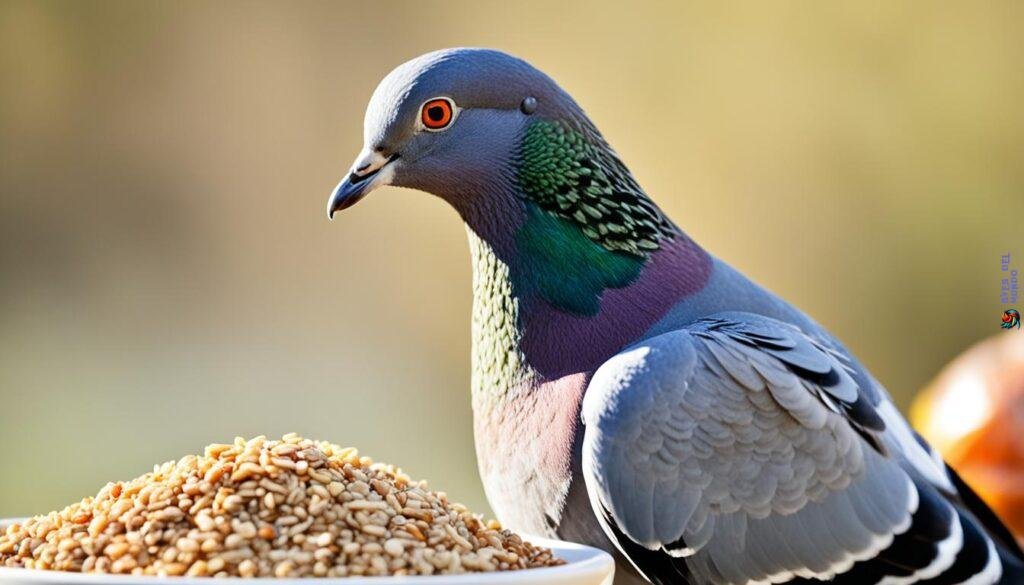
Protein-Rich Snacks for Pigeon Health
Adding protein-rich snacks to their diet improves pigeons’ health. Raw peanuts and legumes are great for protein, which helps build and keep muscle. These snacks help pigeons stay active and healthy. They also make the pigeon’s diet more balanced, avoiding problems from eating too much bread.
To help our feathered friends do well, we must offer a variety of safe foods for pigeons. This makes sure our time with them is good, not bad.
The Impact of Winter on the Pigeon Diet
When winter comes, pigeons change what they eat. They need more calories to stay warm. So, what should pigeons eat in winter to be healthy?
Feeding pigeons things like bread or uncooked rice seems helpful. But these don’t give the nutrients pigeons need in cold weather. What do pigeons eat to keep their energy up during winter?
Nutrient-dense food is key for pigeons when it’s cold. Foods like:
- Assorted seeds (millet, sunflower, safflower)
- Legumes
- Wild bird pellets
- Grains like wheat, barley, and corn
This diet keeps their body heat up and their health strong. Some seeds and grains are high in fat. This gives pigeons the calories they need and also vitamins and minerals.
Avoid fatty human food for pigeons in winter. Offer them a healthy mix of natural foods instead. This gives pigeons a balanced diet to stay warm.
Want to help pigeons in winter? Give them proper food like grains and seeds. This is better for their health than bread or rice.
In summary, pigeons’ winter diet should be thoughtfully chosen. By understanding their needs, we help keep them healthy and alive during tough months.
Do Pigeons Enjoy Other Human Foods?
Pigeons like to eat grains from city sidewalks. But pigeon lovers often wonder about the variety of human foods that are safe foods for pigeons. Besides birdseed and popcorn, these birds enjoy other unexpected foods. This raises the question: What makes a balanced pigeon diet?
Fruits and Vegetables for Pigeons
Pigeons enjoy more than just seeds. They eat fruits and vegetables found in parks and alleyways. Things pigeons can eat include berries and leafy greens. These can be nutritious for them. But they should eat them in moderation. This is to prevent stomach upset and ensure a varied diet.
The Need for a Balanced Pigeon Feed Mix
For those taking care of pigeons, creating a balanced pigeon diet is key. Aim to match the nutrition found in their natural food sources. This means mixing seeds, grains, and legumes. Below is a table. It shows a variety of safe foods for pigeon health and happiness:
| Food Type | Benefits | Recommended Amount |
|---|---|---|
| Grains | Source of carbohydrates and fiber | Main component of diet |
| Seeds | Rich in fats and oils necessary for energy | 25% of diet |
| Legumes | High in protein for growth and repair | 15-20% of diet |
| Fruits | Vitamins and hydration | Occasional snacks |
Knowing what do pigeons eat in the wild helps us feed them right in the city. By doing this, we give them a better chance at a healthy life. And we do it one seed, grain, or fruit at a time.
Pigeons and the Danger of Processed Foods
When talking about a pigeon diet, processed foods like bread are bad. People often ask, «Can pigeons eat bread?» after seeing them eat in cities. These foods don’t have the nutrients pigeons need and can be harmful.
Pigeons do best on natural diets. They should eat seeds, fruits, and vegetables they find in nature. Sadly, processed foods have additives that hurt pigeons. This can lead to malnutrition and diseases, making them easy targets for predators.
Feeding pigeons processed foods can make them too heavy. It also makes them rely too much on food from humans. This changes their natural eating habits and keeps them from learning to find their own food.
While watching pigeons gather is nice, we must feed them properly. It’s important for their diet and long life.
- Choose natural grains over processed ones
- Stay away from very salty or sugary foods
- Think about pigeons’ long-term health before feeding them
Helping pigeons eat right helps them and our cities. Remember, bread may seem harmless, but it’s bad for pigeons’ health in the long run.
Feeding Feral vs. Domestic Pigeons
It’s vital to know the food needs of city pigeons versus domestic ones for their health. City pigeons often eat leftovers, like bread, found in urban areas. This diet helps them survive but may not be the best for their health. Domestic pigeons, however, get a diet that’s carefully chosen for their nutritional needs.
The Varied Diets of City Pigeons
City pigeons mostly eat what they find, which includes scraps left by people. Feeding them bread is common but doesn’t meet their nutritional needs. Such a diet can cause health problems, so pigeon feeders should think carefully about what they feed them.
What Domestic Pigeons Thrive On
Domestic pigeons eat a better diet that includes grains, seeds, and legumes. This balanced diet keeps them healthy and avoids the problems from eating processed and human foods.
| Food Type | City Pigeons | Domestic Pigeons |
|---|---|---|
| Grains | Often processed leftovers | Whole grains, pigeon-specific mixes |
| Seeds | Occasional, mixed with scraps | Varied and frequent, high-quality seeds |
| Legumes | Rarely | Regularly included in diet |
| Vegetables | Seldom found | Often part of a balanced diet |
| Processed Foods | Common (like bread) | Highly discouraged, almost non-existent |
Now you know the diet differences between city and domestic pigeons and why proper nutrition is crucial. Taking care to feed them appropriately benefits their health and the health of their species.
How Feeding Practices Affect Pigeon Health and Population
Feeding pigeons can be a joyful experience. But, not all feeding habits are good for their health. Feeding them the right diet makes them thrive. This is important for their health and helps keep the pigeon population strong.
We need to think carefully about what we feed pigeons. Stop feeding them processed foods like bread. Learning about their proper diet can help them live longer and healthier lives. What we feed them affects their health and how long they live.
Creating a healthy pigeon community is something we all can do. By knowing what they need to eat, we can keep them healthy. Our efforts help keep pigeons, and our cities, vibrant and balanced.
